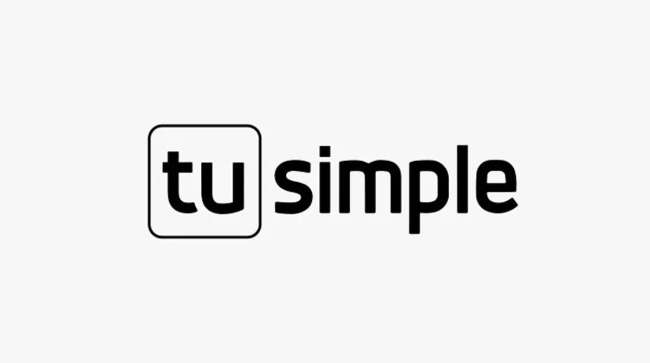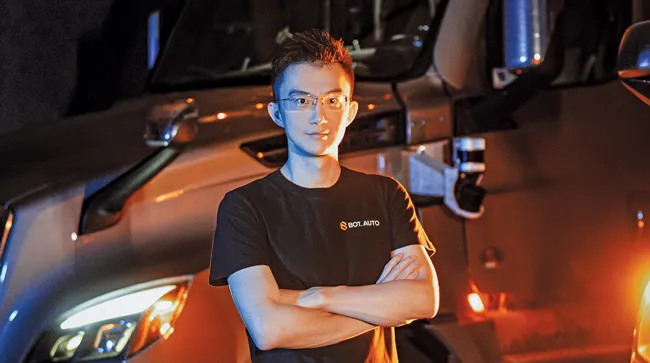Staff Reporter
Ex-TuSimple CEO Hou Seeks to Liquidate Company’s Assets

[Stay on top of transportation news: Get TTNews in your inbox.]
Acrimony over TuSimple’s remaining cash pile and intellectual property intensified in recent days, with a co-founder calling for the one-time autonomous trucking pioneer to be liquidated and the company suing the ex-employee for alleged trade secret theft.
TuSimple co-founder and former CEO Xiaodi Hou, who claims to be the company’s largest shareholder, is also seeking judicial aid in an increasingly bitter spat with former colleague Mo Chen.
The company, which exited the U.S. autonomous trucking space in December 2023 after a series of layoffs and retrenchments, has around $450 million in cash reserves, according to a letter obtained by Transport Topics. In April 2021, TuSimple raised $1.35 billion in an initial public offering.
TuSimple, now operating primarily in China under Chen and CEO Cheng Lu, brands itself as a global artificial intelligence technology company, focusing heavily on generative AI applications in the animation and video game industries.
However, the company remains headquartered in San Diego. It also continues to report to the U.S. Securities and Exchange Commission, although it delisted from Nasdaq in February.
John Elliott of Load One demonstrates how onboard video combined with AI-enabled analytics can transform fleet safety. Tune in above or by going to RoadSigns.ttnews.com.
Hou is seeking redress through the U.S. court system. In a Nov. 25 letter to the company’s board, Hou said $150 million was transferred to TuSimple’s Chinese subsidiaries and warned the remaining $450 million could follow.
He said funds intended for developing self-driving trucks globally are being redirected to gaming and animation advances without shareholder approval.
He warned shareholders were being done a disservice.
He is seeking a temporary restraining order in the U.S. District Court for the Southern District of California to restrict financial transfers to China from the U.S. “beyond normal business operations.”
In addition, Hou — who is still developing autonomous trucks with a new venture named Bot Auto — is seeking injunctive relief in the Delaware Court of Chancery over the voting rights of his stake in TuSimple, which he argues Chen “claims to control.”

Hou brought his latest autonomous trucking startup Bot Auto out of stealth in September. (Bot Auto)
Hou also wants to postpone TuSimple’s scheduled Dec. 20 annual meeting, which he alleges would implement governance changes that would leave him at a disadvantage in his dispute with Chen.
TuSimple in October, meanwhile, filed suit in Texas Business Court, alleging Hou misappropriated TuSimple trade secrets related to its sensor suite and perception technology, decision making technology and automatic safety technology.
The company obtained a temporary restraining order against Bot Auto and is waiting on a temporary injunction request verdict. The next hearing in the case is scheduled for Dec. 9.
In response to the allegations by Hou, however, TuSimple told TT it had received the letter and the courts would address the matters raised by Hou, plus factual inaccuracies.
TuSimple also said it does not believe liquidation would realize the most value to shareholders. Liquidation, it noted, was likely to insulate Hou and Bot Auto from further litigation.
Hou departed TuSimple twice amid a barrage of accusations and counteraccusations. The board initially dismissed him in October 2022, but he then became the sole board member, a position he resigned in March 2023. The resignation sparked heated exchanges with fellow co-founder Chen.
The initial departure in 2022 resulted from what the then-board said was a lack of trust and confidence in Hou.
Hou’s exit was triggered by an audit committee probe of allegations of approaching fellow employees about leaving the company and forming a new venture, TuSimple said in a March 2023 SEC filing.
Meanwhile, TuSimple first sought to sell its Asian assets, and then its U.S. assets. The latter plan found no buyer and the U.S. operations were wound down in a disappointing exit for one of the pioneers of the U.S. self-driving truck space.
Want more news? Listen to today's daily briefing above or go here for more info
In July 2020, TuSimple inked a partnership with the then-Navistar to develop Level 4 U.S. autonomous trucks that were scheduled to be in production by 2024. Later that year, Navistar’s future parent company Traton announced plans to develop similar trucks in Europe. Traton also took a stake in TuSimple.
Other investors prior to the IPO included U.S. Xpress Enterprises and Werner Enterprises. U.S. Xpress was acquired by Knight-Swift Transportation in a deal announced in March 2023. The combined entity ranks No. 7 on the Transport Topics Top 100 list of the largest for-hire companies in North America. Werner ranks No. 16 on the for-hire TT100.
TuSimple also inked partnerships with UPS, first teaming up in 2019, and Ryder System Inc. UPS ranks No. 1 on the for-hire TT100 while Ryder ranks No. 6.
The Navistar partnership was dissolved in December 2022. In March, Navistar — which would be rebranded as International Motors in September — teamed up with Plus to develop hub-to-hub autonomous Class 8 trucks. A commercial pilot program with fleet customers is due to begin by the end of this year.
Autonomous vehicles are classified in levels 1 to 5. Level 4 does not require human interaction in most circumstances, but a driver can still manually override systems.





